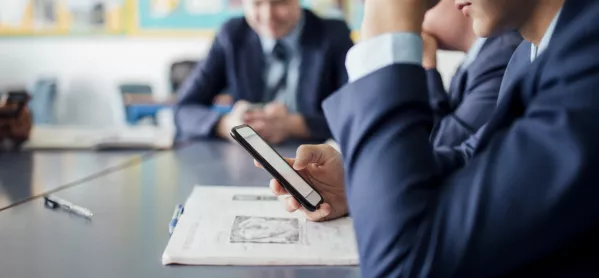Teenagers should not be allowed mobile phones in schools because their brains are not mature enough to exercise self-control, the principal of Gordonstoun School has said.
Lisa Kerr said schools needed to set boundaries and teach children how to control technology, rather than allowing it to control them.
Her comments came after another head, who is incoming president of the Girls’ Schools Association, suggested mobile phones should not be “demonised” and could be a force for good in the classroom.
Jane Prescott, who is also head of Portsmouth High School, said it was the responsibility of schools to show the positive aspects of the devices, and that banning them simply meant youngsters used them in places where they could not be monitored.
Quick read: Don’t ‘demonise’ mobile phones, schools’ leader urges
A new school’s approach: School mobile phone ban ‘wonderful’, says psychologist
Opinion: Why I banned smartphones - and what happened next
But Ms Kerr, principal of Gordonstoun - the 13 to 18 boarding school in Moray, Scotland, whose past students include the Duke of Edinburgh and the Prince of Wales - objected, arguing that all schools could help pupils to develop their potential by implementing a mobile phone ban.
Should schools ban mobile phones?
She said: “Technology has an important role to play in the classroom but it has to be controlled.
“Teenage brains aren’t sufficiently developed to exercise the necessary self-control, so the adults in their lives need to set boundaries.
“Just as you wouldn’t leave out bowls of sweets and expect children to eat sensibly, we need to help our students to control technology rather than allowing technology to control them.
“Some of our parents make considerable sacrifices to send their children here because they are worried about the negative effect of mobile phones.
“They know that, in our school, that pressure has been removed and their child will be having real, not virtual, adventures.
“It is time for all schools to help pupils develop their full potential through the simple step of a mobile phone ban.”
Gordonstoun introduced a ban in 2017, and pupils are not allowed to use their devices from breakfast until the end of lessons and activities, unless directed by a teacher. Those seen using a phone without permission face having it confiscated.
Ms Kerr added: “One of the immediate effects of our ban on mobile phones was an increase in noise levels, which we see as a good thing.
“Children are holding conversations, sharing jokes and catching up with each other face to face, not via social media. They are developing great social skills.”
Mrs Prescott had argued that pupils could use phones in schools for positive purposes, such as photographing a teacher’s example in a lesson or sports team lists.
She said: “We demonise mobile phones. And there is certainly an aspect of mobile phones that is destructive - excessive social media use, being able to promote the celebrity culture, gaming on mobile phones.
“But there’s also a huge positive with them, in that communication has never been easier, or better.
“It’s our responsibility in schools to show the positive aspect of having a mobile phone, what it can be used for in a good way. And helping [students] overcome those negative aspects of having a mobile phone.”
Ms Prescott said that at Portsmouth High, a private school for girls aged 3 to 18, phones were banned in the dining room as it was a social space, but were allowed in lessons when needed.
She said: “They’re not going to go away, we can’t be Luddite about it, we can’t stick our heads in the sand and hope that time will turn it back, because it won’t. They’re here to stay.”




